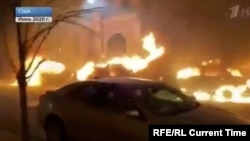Even as violent disturbances in the U.S. over the May 25 death of African-American security guard George Floyd lessen, Russia’s pro-Kremlin media continues to emphasize the street turmoil of recent weeks, using a combination of mockery, disinformation, and, most recently, film editing.
On June 7, Russia’s state-run Channel One appeared to insert violent footage from clashes between U.S. police, protesters, and rioters into the credits for the Russian cult film Brat-2 (Brother-2), broadcast on state TV to mark the 20th anniversary of the mafia movie’s release. As the soundtrack song known as Goodbye, America played in the background, viewers watched cars being overturned and police beating demonstrators with batons. The footage preceded the channel’s evening newscast Vremya, which rigorously follows the government line.
In a June 8 statement, Channel One implied that the music, performed by the classic Soviet-Russian rock band Nautilus Pompilius, had simply merged with Vremya’s top story about the U.S. protests.
If viewers perceived “allusions” in the film’s ending to the unrest, the station commented to mainstream news site Lenta.ru, that only indicates that “genuine creativity remains relevant after 20 years as well.”
The film’s producer, Sergei Selyanov, told Gazeta.ru that no rights restriction bars Channel One from making such a change if it sees fit.
But some Russians have taken issue with pro-Kremlin media’s blanket coverage of police brutality and unrest in the U.S.
On Twitter, an assortment of libertarian activists and supporters heavily promoted #RussianLivesMatter, based on the hashtag #BlackLivesMatter, to speak out against excessive – and, at times, lethal -- force used by Russian police against ordinary citizens.
“Emphasizing what’s going on in the U.S. and keeping quiet about what’s going on in Russia, that’s Russophobia,” commented Estonia-based digital security business owner Aleksandr Litreev.
But in highlighting the violence that marred protests last week against Floyd’s death in police custody, pro-Kremlin media outlets do not focus only on the U.S. They have also found a way to include Ukraine, an adversary in territorial conflicts over the Crimean peninsula and the eastern Ukrainian region of Donbas.
Mainstream sites have described the 35-year-old oil Minnesotan Bogdan Vechirko, who drove an empty oil tanker into a crowd of Minneapolis protesters on June 1, as a Ukrainian who served with Ukrainian forces in the Donbas conflict and is “an avid fan of Donald Trump.”
“It’s not an undisclosed secret for anyone” the popular tabloid Moskovsky Komsomolets declared on June 1, that Ukrainian soldiers who fought in Donbas “have major psychiatric problems and uncontrolled aggression.”
In reality, Vechirko is a Russia-born American citizen, who has never served in the Ukrainian army, according to U.S. and Ukrainian officials. On Facebook, the General Staff of the Armed Forces of Ukraine rejected news reports about Vechirko allegedly fighting in Donbas as “openly manipulative and untrue.”
Vechirko has been released from police custody while an investigation into the incident is ongoing. Minnesota’s State Public Safety Commissioner John Harrington stated that no evidence exists that suggests Vechirko was intentionally trying to hit demonstrators.
Outlets who misidentified Vechirko as a Ukrainian Donbas veteran do not appear to have since updated their reporting, however.
To some observers of mainstream Russian media, the rationale is clear. In state broadcasters’ thinking, “If there’s a possibility to demonstrate that everything is bad in America, this needs to be demonstrated,” veteran broadcast and print journalist Konstantin Eggert commented on Current Time’s June 5 Footage Vs. Footage. “Whether this is happening because of Antifa or the Klu Klux Klan, because of an incompetent Democratic president or an incompetent Republican president isn’t important.”
Eggert believes it likely that “the Kremlin’s bot firm” – an apparent reference to the Internet Research Agency – will begin preparing memes “with American police beating someone” and “ironic” messages that ask viewers if they want conditions to become like in the U.S.
On June 1, former U.S. National Security Adviser Susan Rice alleged on CNN that Russia likely used social media to encourage “extremists” who she believes have stirred up violence in the protests. Kremlin financing for such groups would not be unexpected, she added.
“I’m not reading the intelligence today, or these days, but based on my experience, this is right out of the Russian playbook,” Rice said.
Others have been less explicit. Current National Security Advisor Robert O’Brien has stated that unidentified “Russian activists” may be playing some role in the riots, while Senator Marco Rubio, a member of the Senate Committee on Foreign Relations and the Select Committee on Intelligence, has noted that social-media accounts “linked to at least 3 foreign adversaries” have been energetically covering the turmoil. Rubio did not specify these countries or groups.
Kremlin officials have scoffed at the notion that Russia plays any such role.
On June 1, presidential spokesman Dmitry Peskov curtly dismissed the notion that Moscow takes any unusual interest in the U.S. protests, insisting that "We have never meddled in US affairs and we are not going to interfere now.”
Meanwhile, Foreign Affairs Ministry spokeswoman Maria Zakharova took to Facebook, posting an English-language note to Rice that rejected her remarks as “a perfect example of barefaced propaganda,” and urged her “to come back to reality.” The missive concluded with a “Not Yours” signoff.
Following that line, the English-language RT network has asked viewers if perhaps U.S. citizens should blame Russia for slavery and segregation as well.
These tactics come as no surprise to Eggert. Russian journalists working for state-run outlets “execute the Kremlin’s orders,” he noted.
The protest likely will be used ahead of the U.S. presidential elections this November as well, Eggert predicted.
“Chaos in the United States is advantageous to the Kremlin,” he said.





Facebook Forum